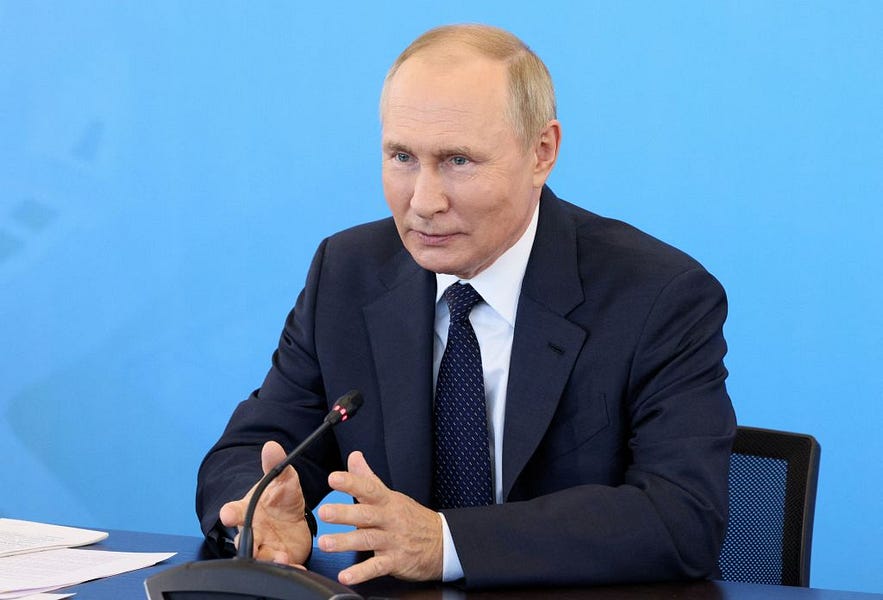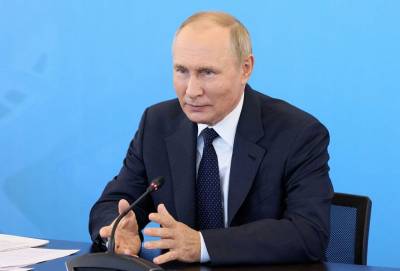Russian President Vladimir Putin gave a speech Wednesday foreshadowing the eventual annexation of Russian-controlled areas in Ukraine, announcing the mobilization of 300,000 soldiers, and most ominously, yet again threatening the use of nuclear weapons. The following are my initial thoughts on these developments.
Here's what Putin said. He began by addressing the “Citizens of Donetsk and Luhansk, the People’s republics of Kherson and Zaporizhzhia, and other people free from the Nazi regime,” equating them with Russian citizens and promising, “We will be talking about steps of protecting our sovereignty, the will and desire of our citizens to determine their own future, and about the aggressive bloc of Western countries that are trying to keep their supremacy at all costs—that are trying to block and suppress any independent centers of development in order to force their will in brutal ways on others.”
After reiterating his delusional talking points about the conflict in Ukraine being started by Kyiv and the West and explaining that his “special military operation” continues “village by village, and helping people turned into hostages by the criminal [Ukrainian] regime,” he lays out his plans for what comes next.
First, there will be referendums in the controlled areas.
“We have a moral right to give people that are dear to us, who are being tortured, we need to give them a chance to determine their own fate. The parliament of the LPR, and the DPR, and the Kherson and Zaporizhzhia regions have decided to hold referendums on joining Russia and have asked Russia to support such a step. I stress that we will do all that we can to create safe conditions to hold the referendums, so people can express their will and decision about the future. They will be supported by us.”
These referendums are a thin pretext for the eventual annexation of these areas and, after annexation, Putin is likely to claim Ukrainian military operations to retake them constitute attacks on “Russian soil.” It’s bull, but it’s consistent.
Second, to secure these referendums and to reinforce the frontlines against “the collective military machine of the whole West,” there will be a “partial military mobilization” of an undetermined size. Russian Defense Minister Sergei Shoigu suggested later that the draft will be capped at 300,000 individuals, but Putin is likely leaving this ambiguous in an effort to maintain flexibility and to manage domestic opposition.
“In defense of our motherland, to ensure its safety, territorial integrity, security of our people and in the free territories I deem it necessary to support the decision of the Ministry of Defense and the general command for a partial mobilization held in the Russian Federation. I stress that it is partial mobilization. Only those who are currently in reserve will be conscripted, and also those who served in the army and have certain military skills. They will be given additional military training, taking into account the special military operation. The decree has been signed, officially the chambers of the federal assembly and Duma will be informed.”
Finally, Putin issues his nuclear threat.
“There are plans in Washington and Brussels to move the military action on to Russian territory. They are not just talking about Russia being destroyed on the battlefield, they are talking about political, cultural, and all other types of sovereignty with complete pillage. Now they're talking about nuclear blackmail. … Those who make such statements will be reminded that our country also has various weapons of destruction and with regard to certain components they are even more modern than the NATO ones. If there is any threat to the territorial integrity of our country and to protect our people we will certainly use all means available to us. I'm not bluffing.
Russia citizens can be certain that the territorial integrity of our motherland, our independence and security will be assured. I shall stress—by all means available to us. And those trying to blackmail us with nuclear weapons should know that the tables can turn on them.”
Anecdotally, immediately following the speech, prices for flights out of Russia skyrocketed (nearly doubling) and all available seats are now fully booked. Not the response Vlad was looking for, I’m sure.
The speech plays to type but it should not be dismissed. The Russian military has experienced a massive setback in the wake of Ukraine’s successful counteroffensive last week in the Kharkiv oblast and Putin had to respond. The invasion itself is faltering across the board and needs to be shored up, and the former KGB strongman would appear even weaker if he failed to act. Nothing in the speech is surprising.
The referendums are a continuation of the false narrative that Russia is acting in defense of Russian-speaking communities who want to be freed from Ukrainian Nazis and reunited with Mother Russia. The mobilization is an operational imperative. Many observers peg the total number of Russian troops in Ukraine—including volunteers, private military contractors, and aligned separatists—at about 200,000. But with these numbers having been decimated by somewhere near 80,000 deaths, at least 165,000 injuries, and more than 1,000 prisoners of war, some form of conscription was inevitable. And, finally, the nuclear threats are in keeping with Putin’s petulance and Moscow’s well-discussed “escalate to de-escalate” nuclear deterrence doctrine—which was updated in 2000 to allow the use of Russian nuclear weapons, not only when the “existence of the Russian Federation” is at stake, but also “in response to large-scale aggression utilizing conventional weapons in situations critical to the national security of the Russian Federation.”
But again, familiarity with these strategies should not lead to our complacency.
The U.S. response should be calm, measured, and unflinching. When speaking to the U.N. General Assembly yesterday, President Biden responded to Putin’s declarations saying, "A permanent member of the United Nations Security Council invaded its neighbor, attempted to erase a sovereign state from the map. Russia has shamelessly violated the core tenets of the United Nations Charter.” He further warned, “This war is about extinguishing Ukraine's right to exist as a state, plain and simple, and Ukraine's right to exist as a people. Wherever you are, wherever you live, whatever you believe, that should ... make your blood run cold." A fine rhetorical response, but more will be needed.
First and foremost, everybody needs to stay calm. While I firmly believe Putin could be willing to use low-yield nuclear weapons in Ukraine, hyperventilating about the prospect does nothing to prevent it. We should not escalate by, as some have argued, explicitly bringing Ukraine under the American nuclear umbrella or by some other similar action. But neither should we shrink back from our support of Kyiv or in any way communicate threatening Americans with nuclear weapons is an effective means of shaping U.S. policy. Just the opposite—we should send very clear messages that our resolve remains unchanged, that Putin must leave Ukraine, and that the United States possesses both the means and the will to deal decisively with Russia’s nuclear capabilities.
My colleague and boss at AEI, Dr. Kori Schake, succinctly laid out a series of policies that capture the sense of stone-cold resolve I’m looking to project. We should, Kori says, “expose any Russian units moving nuclear weapons toward Ukraine, interdict their use, [and] hunt down anyone involved in the policy decision or its execution.” That’s bold policy and would require rock-ribbed commitment. And it’s exactly what we should do. I would also encourage the United States to increase its support to Ukraine, including the provision of longer-range weapons systems, fighter aircraft, and modern tanks with the requisite training for their effective use. This demonstrates Putin’s threats are counterproductive to his own cause and places the United States and Ukraine in a better position to respond to an operational escalation, if and when it occurs.
Some on the political right, notably national conservatives (natcons) arguing for a “restrained” American foreign policy, are citing the Russian president’s threats as yet another reason the United States should reduce (or completely end) its aid to Ukraine. I think this is exactly wrong because, though we didn’t know in February that events would unfold as they have, we now can meaningfully cut Russia’s ability to threaten its neighbors and challenge American interests for a generation or more. As Fred Kagan eloquently observed, “We’re paying another country to fight a horrible war on its own soil so that we won’t have to fight a worse one on the soil of a NATO ally.” This is as much of a realpolitik assessment as any that has been offered by natcons, only it has the additional benefit of being true. And the American people understand.
Most polled Americans are in it to win it. The Chicago Council on Global Affairs completed a poll last month showing, “Few Signs of ‘Ukraine Fatigue’ Among American Public.” The survey included more than 3,000 U.S. adults across all 50 states and has a margin of sampling error of just +/- 1.8 percentage points. In other words: This is a methodologically strong poll, and its findings are worthy of serious consideration. Here are the key takeaways:
• Majorities continue to support U.S. economic and diplomatic sanctions against Russia (80%), accepting Ukrainian refugees into the United States (76%), providing additional arms and military supplies to the Ukrainian government (72%), and giving economic assistance to Ukraine (71%);
• By a six-to-four ratio, Americans say the United States should support Ukraine for as long as it takes, even if American households will have to pay higher gas and food prices in consequence;
• Nearly two-thirds think the invasion sets a precedent that other countries can launch wars for territorial gain (64%); and,
• An even larger majority believes the Russian invasion will encourage China to invade Taiwan (76%).
And this support is bipartisan. For example, 78 percent of Republicans and 85 percent of Democrats said they supported “increasing economic and diplomatic sanctions on Russia.” When asked about sending “additional arms and military supplies to the Ukrainian government,” 66 percent of Republicans and 84 percent of Democrats thought it was a good idea. Even when asked about accepting Ukrainian refugees and providing non-military economic assistance to Kyiv—points cited by the Heritage Foundation as reasons for opposing U.S. aid to Ukraine—most Republicans said they would support such policies (66 percent and 64 percent, respectively). The key takeaway here for our elected leaders is that the American people support broad assistance to Ukraine, want this help to be decisive, and understand our strategic interests in punishing Putin’s aggression.
And this brings me to my final observation: We have a long way to go.
The Russian mobilization will take months and is likely to have deployment delays due to equipment and logistics weaknesses. The Ukrainian military, likewise, may try to press its advantages on the margins, but a similar counteroffensive in the south seems unlikely in the near-term as its forces attempt to regenerate, refit, and dig in for what is likely to be a long winter fight.
Ukraine’s gains will have hopefully fortified its coalition in Europe, but this support will require constant tending as government leaders in Germany, Hungary, Slovakia, and elsewhere deal with Russia’s cutting off natural gas supplies and the resultant elevated costs and dwindling supply of essential energy. Government leaders across the continent are going to push Ukrainian President Volodymyr Zelensky to moderate his strategic objectives and to settle with Putin as quickly as possible. Zelensky, however, shows no signs of such compromise—I don’t blame him—and so the fight will go on.
From the perspective of Putin, the pressure is on to reassert Russian strength and his own political power—don't be surprised if he gets more, not less, aggressive in the near term. The man in Moscow is going to be more dangerous as his losses pile up.
When I first joined the U.S. intelligence community, all Russia watchers were encouraged to read a series of interviews recorded in the book, First Person: An Astonishingly Frank Self-Portrait by Russia’s President Vladimir Putin. I’ll close with this anecdote, described by Putin himself, as a way of illustrating just how much this man is willing to risk in order to satisfy his appetites.
“Once I was driving with my senior coach from Trud to a base outside Leningrad. I was in university at the time. A truck with a load of hay was coming from the other direction. My window was open, and the hay smelled delicious. As I drove past the truck on a curve, I reached out the window to grab some straw. The car suddenly swerved … Whoops! The steering wheel turned, and we were headed toward the rear wheel of the truck. I turned the wheel sharply in the other direction, and my rickety Zaporozhets went up on two wheels. I almost lost control of the car. We really should have ended up in a ditch, but fortunately, we landed back on all four wheels.
My coach sat there, frozen speechless. Not until we pulled up at the hotel and he got out of the car did he look at me and say, “You take risks.” Then he walked away ... What drew me to the truck? It must have been the sweet smell of the hay.”
That’s it for this edition of The Current. Be sure to comment on this post and to share this newsletter with your family, friends, and followers. You can also follow me on Twitter (@KlonKitchen). Thanks for taking the time and I’ll see you next week!







Please note that we at The Dispatch hold ourselves, our work, and our commenters to a higher standard than other places on the internet. We welcome comments that foster genuine debate or discussion—including comments critical of us or our work—but responses that include ad hominem attacks on fellow Dispatch members or are intended to stoke fear and anger may be moderated.
With your membership, you only have the ability to comment on The Morning Dispatch articles. Consider upgrading to join the conversation everywhere.